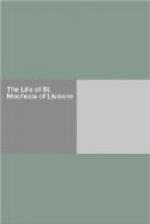“Of the Abbot of a Church.
1.—If you be the
head man of a Church noble is the power,
better for you that you be just who take the heirship
of the
king.
2.—If you are the
head man of a Church noble is the
obligation, preservation of the rights of the Church
from the
small to the great.
3.—What Holy Church
commands preach then with diligence;
what you order to each one do it yourself.
4.—As you love
your own soul love the souls of all. Yours
the magnification of every good [and] banishment of
every evil.
5.—Be not a candle
under a bushel [Luke 11:33]. Your
learning without a cloud over it. Yours the
healing of every
host both strong and weak.
6.—Yours to judge
each one according to grade and according
to deed; he will advise you at judgment before the
king.
. . . . . . . . . .
. . .
10.—Yours to rebuke
the foolish, to punish the hosts,
turning disorder into order [restraint] of the stubborn,
obstinate, wretched.”
Reservation of the Coarbship of Mochuda at Lismore in favour of Kerrymen is an extremely curious if not unique provision. How long it continued in force we do not know. Probably it endured to the twelfth century and possibly the rule was not of strict interpretation. Christian O’Connarchy, who was bishop of Lismore in the twelfth century, is regarded as a native of Decies, though the contrary is slightly suggested by his final retirement to Kerry. The alleged prophecy concerning Kerry men and the coarbship points to some rule, regulation or law of Mochuda.
Life of st. Mochuda or “Beata MOCUDA”
The renowned bishop, Carthach, commonly called Mochuda, was of the territory of Ciarraighe Luachra [North Kerry] and of the race of Fergus Mac Roigh.
The illustrious bishop, who is generally known as Mochuda, was of the Ciarraighe Luachra; to be exact—he was of the line of Fergus Mac Roigh, who held the kingship of Ulster, till the time that he gave the kingship to a woman for a year and did not get it back when the year was over. His descendants are now to be found throughout various provinces of Ireland. He fell himself, through the treachery of Oilioll, king of Connaght, and the latter’s jealousy of his wife, Meadbh, daughter of Eochaid




